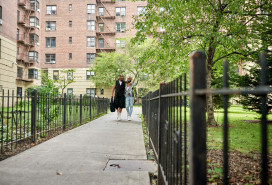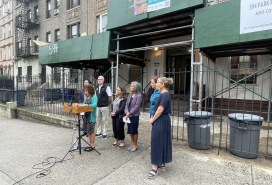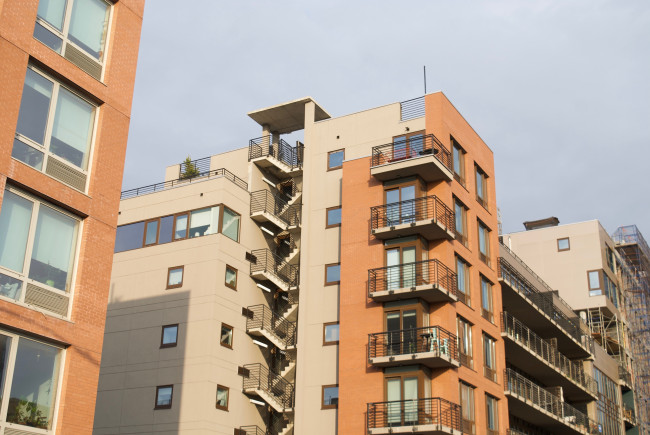What can you do if a landlord or agent ignores the new rent laws?

When you find an apartment listing that flouts the new rental laws, you have to weigh standing up for your rights vs. losing the rental.
iStock
I saw an apartment online that I like but the listing asks for first and last month’s rent—plus a security deposit. When I sent a text to the agent saying landlords can’t ask for last month’s rent anymore, she stopped responding. What can I do when an agent or landlord ignores the new rent laws?
Some New York City renters are encountering scenarios that are illegal under the Housing Stability and Tenant Protections Act of 2019. The rent reforms offer unprecedented protections for both rent-stabilized and market-rate tenants.
Most of NYC's major brokerages and managed rental buildings are compliant with the new laws but that's not to say you won't find landlords or agents who are flouting the rules or are overwhelmed by what they might consider onerous procedures now required by the law.
Here are some tactics you can try if you think a landlord or a agent is not following the law.
If a landlord is asking for additional rent upfront
When you find an apartment you like but the landlord is requesting more than one month's rent as a security deposit or a fee they shouldn't, the law is on your side. However, the competition for NYC apartments these days is fierce and the new legislation does not specify how to remedy a situation in which the landlord isn’t obeying the law. You risk losing the apartment if you assert yourself but you don't want to be asked to pay more than you should, after all, some of the protections in the new rent laws offer significant savings. How do you walk this fine line?
One option is a low-key approach. You can send an email saying you really like the apartment, and explain why you'll make a great tenant, but say you know the rent laws have changed and want to clear up any confusion. You can also attach a news article (for example, one of Brick Underground's many articles on the new rent laws) to back up your argument.
“There’s little guidance from the courts, so many landlords are left in the dark. While larger buildings tend to have many resources and lawyers, some mom and pop landlords don’t,” says Jason Blumberg, a staff lawyer at Mobilization for Justice.
Be aware you risk not getting the apartment when you push back against a landlord. You have to use your judgment.
If a landlord hasn't returned your security deposit
If you have moved out and it has been more than two weeks, and your landlord hasn’t reimbursed your security deposit or sent you an itemized list of repairs with the remaining funds, you can take legal action. First, you can have a lawyer draft a letter explaining that they are violating the law, says Blumberg. You can also file a complaint with the Attorney General’s office. If that doesn’t work, you can take the landlord to Small Claims Court. And check out Brick Underground's "Inside scoop on security deposits and how to get yours back."
If an agent is asking for more than $20 for an application fee
Last year's rent reforms capped the application fee for a rental apartment in NYC to $20 for a background or credit check. If you provide current copies of these documents the law states this fee must be waived. If you paid more than $20 to a landlord, leasing agent, or broker for this service since June 2019, you may be entitled to a refund.
Keep in mind the $20 application fee is separate from a broker fee. There’s one exception: If you end up renting in a co-op or condo building, you can be asked to pay a fee to the board, which will likely be more than $20 and is entirely legal. For more on how to contest your application fee overcharge, read Brick Underground's tips on how to get a refund.
You can always walk away
When a broker or landlord tries to overcharge you for an application fee or a security deposit, consider moving on before you have to pay, says Blumberg.
“You’re at a point where you haven’t even established a landlord/tenant relationship,” he says.
Stay informed and watch for more changes to the rent laws
You can expect more changes to come. Some landlords have filed lawsuits to challenge the rent reforms, claiming that it violates the Fair Housing Act, and will prevent them from being able to afford repairs and renovations.
A judge recently suspended guidance issued by the Department of State, which had interpreted a section of the rent laws as proof it was illegal for renters to be asked to pay a fee to a landlord’s broker other than the $20 background or credit check cost. (Agents hired by renters could still collect a fee under the new guidance.) It would make sense to hold onto paperwork associated with the payment of the broker fee until the courts decide what happens next.
The majority of Democrats in the Senate and House are also supporting a “good cause” eviction bill, which would create universal rent control, cap rent hikes, and permit leases to be renewed as long as you’re paying rent and not being disruptive.































